U bent hier
Internet Archive
Here’s how to participate in Monday’s oral arguments
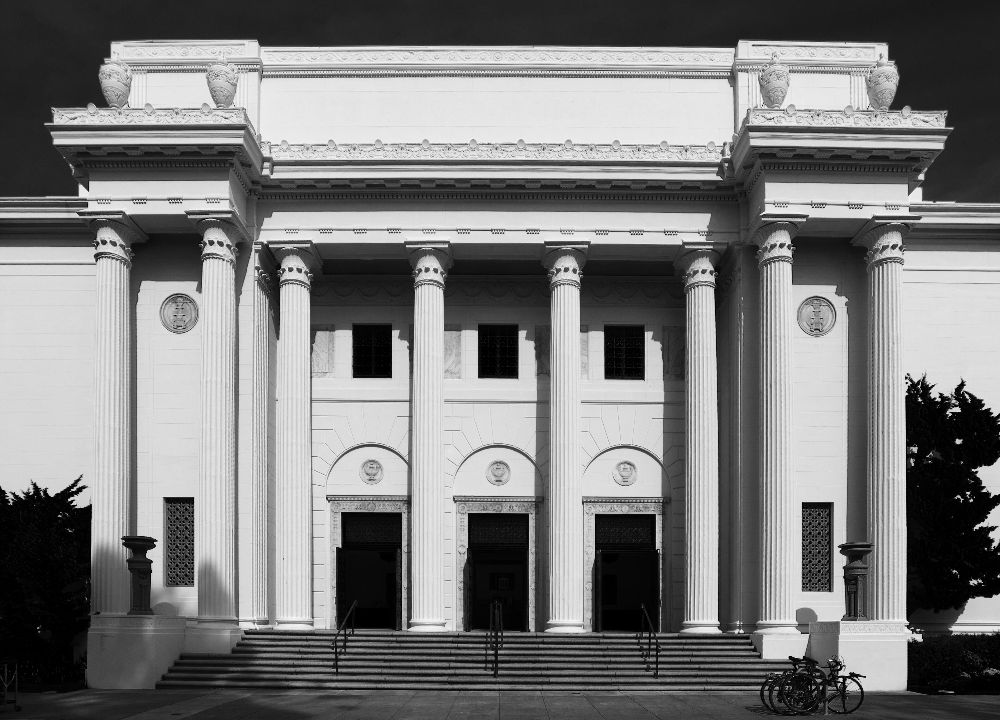
We’re standing up for the digital rights of all libraries in court! On Monday at 1pm ET, the Southern District of New York will hear oral argument in Hachette v. Internet Archive, the lawsuit against our library and the longstanding library practice of controlled digital lending, brought by 4 of the world’s largest publishers.
Here’s how you can participate in the proceedings:- At 1pm ET, listen to the oral argument. This hearing is happening via telephone. You can join via 1-888-363-4749, with access code 8140049.
- During the proceedings, watch the live blog hosted by Library Futures: https://controlleddigitallending.org/hachette-v-ia-liveblog While oral arguments are happening, library and copyright experts Michelle Wu, Kyle K. Courtney, and Dave Hansen will be providing running commentary on the proceedings.
- Immediately after the proceedings, join a live discussion with Michelle Wu, Kyle K. Courtney, and Dave Hansen. Register at https://forms.gle/ATuwmiNDNPUBovZm9
The post Here’s how to participate in Monday’s oral arguments appeared first on Internet Archive Blogs.
Book Talk: Digital Copyright
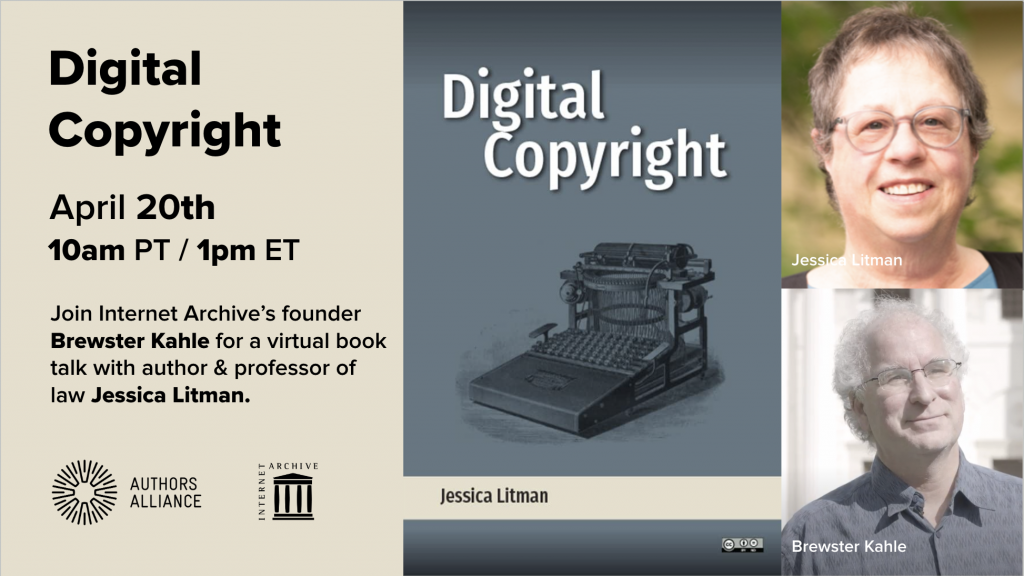
Join Internet Archive’s founder BREWSTER KAHLE for a virtual book talk with author & professor of law JESSICA LITMAN.
In Digital Copyright, law professor Jessica Litman questions whether copyright laws crafted by lawyers and their lobbyists really make sense for the vast majority of us. Should every interaction between ordinary consumers and copyright-protected works be restricted by law? Is it practical to enforce such laws, or expect consumers to obey them? What are the effects of such laws on the exchange of information in a free society?
REGISTER NOWPROFESSOR JESSICA LITMAN, the John F. Nickoll Professor of Law, is the author of Digital Copyright and the co-author, with Jane Ginsburg and Mary Lou Kevlin, of the casebook Trademarks and Unfair Competition Law: Cases and Materials.
BREWSTER KAHLE, founder and digital librarian of the Internet Archive, has been working to provide universal access to all knowledge for more than 25 years.
Book Talk: Digital Copyright
April 20, 2023 @ 10am PT / 1pm ET
Register now for the free, virtual discussion
The post Book Talk: Digital Copyright appeared first on Internet Archive Blogs.
Shining a Light on Forgotten Authors & Neglected Books
Brad Bigelow first became fascinated with obscure authors while perusing the vast library stacks at the University of Washington when he was an undergraduate in the late ‘70s.
“I would take down books I didn’t know anything about, just out of curiosity. As I read these books, I quickly realized that the only difference between the writers who get remembered and the ones that get forgotten is luck. It’s not talent or merit,” said Bigelow, noting some just had bad timing, lacked connections or didn’t have enough sales. “There are many good writers who deserve to be remembered.”
In 2006, Bigelow started the website Neglected Books, reviewing lesser-known books in hopes of giving the authors belated exposure for their work and sparking broader interest. Sometimes it can be a challenge to find information about writers and get copies of their often out-of-print books, said Bigelow, of Missoula, Montana, who runs the website as a hobby.
The Internet Archive is his trusted resource, providing access to information anytime, anywhere, he said.
“It’s a world asset. It’s just phenomenal,” said Bigelow. He uses the Archives’ search tools to learn more about authors (through back issues of Publishers’ Weekly and The Bookman magazines, for example) and the digital collection to borrow rare books unavailable elsewhere.
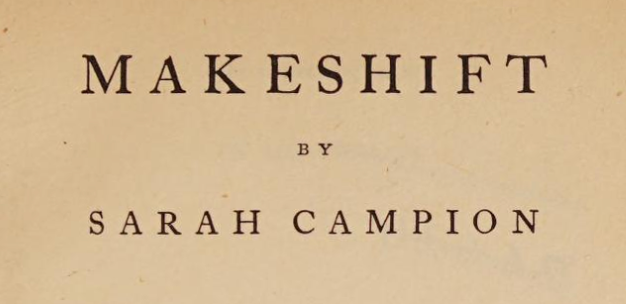
It was on the Internet Archive that Bigelow recently found a copy of “Makeshift,” by Sarah Campion, a 1940 novel about a bright, young Jewish woman’s flight from Nazi Germany. Bigelow published a blog post about “Makeshift” on Neglected Books and then promoted the post on social media, highlighting the rarity of the work. “There are just 19 copies of this book in libraries worldwide. Even Campion’s son doesn’t have a copy. But fortunately, it’s available on the Internet Archive.” Bigelow tweeted about his discovery.
For Bigelow’s top finds, go to a section on his website: Gems from the Internet Archive.
For independent scholars and individuals, access to key resources in the research process such as back issues of old magazines can be limited. Bigelow said he is grateful for the Internet Archive, which offers an alternative to those not affiliated with a college or university, and donates regularly since he relies on its resources for his writing.
 Brad Bigelow, proprietor of NeglectedBooks.com
Brad Bigelow, proprietor of NeglectedBooks.com
On Neglected Books, Bigelow said he enjoys shedding new light on unknown authors. “I don’t think my thoughts are original enough to have anything new to say about Virginia Woolf, James Joyce or Shakespeare,” he said. However, unearthing little-known books that have been all but lost to history is satisfying.
Bigelow appreciates the Internet Archive for protecting cultural artifacts that have disappeared from physical library shelves and making them available to the public. “Information that is not passed on is useless,” he said.
The post Shining a Light on Forgotten Authors & Neglected Books appeared first on Internet Archive Blogs.
Saving 4 Million Books From Landfill
It’s the classic librarian’s dilemma: Because no library has unlimited storage, every library has to carefully manage its physical collection, and that means removing books to make space for new ones. On one hand, it’s exciting to bring in fresh voices, new stories and modern research, but on the other, a library’s main goal is to preserve information over time. So how can librarians manage their physical collections with an eye towards preservation?
Since forming a global literacy partnership in 2019, Better World Books (BWB) and the Internet Archive have offered a unique pathway for libraries to ensure that the books they no longer need in their collections can be preserved and made accessible for generations to come.
The service that BWB provides is an important one for libraries. BWB collects used books from libraries, booksellers, colleges, and universities in six countries, which are then either resold online, donated or recycled. To date, Better World Books has donated almost XX million books worldwide, has raised close to $XX million for libraries and literacy, and has saved more than XXX million books from landfills. Through the partnership with the Internet Archive, BWB has donated more than one million books each year for preservation and digitization.
“What we’ve seen is the lifecycle of books become more complete,” says Internet Archive founder Brewster Kahle. Once books are received from BWB, the Internet Archive digitizes them for patrons with print disabilities, offering readers like Pastor Doug Wilson, who has declining vision, access to books in digital form that are otherwise inaccessible. Then a subset of those books are used for digital lending, interlibrary loan and machine learning.
Dustin Holland, president and chief executive officer of BWB, says the arrangement allows these books to live on and to be put to the best use possible.
“Our goal has always been to maximize the value of the book,” says Holland. “To have a partner to which BWB may donate books that originate from thousands of libraries across multiple countries is a huge win for us, for the Internet Archive, and for our libraries. At the end of the day, it’s also beneficial for humanity, because there will always be access to these books.”
Supporting Ukrainian students
In May of 2022, BWB partnered with the Internet Archive to help support Ukrainian students and scholars. Customers were invited to contribute $1 with each BWB purchase, raising $17,200 to support the sourcing and digitizing of materials to preserve Ukrainian culture and heritage. This included more than 900 books that will become connected citations on the Ukrainian language Wikipedia page, in addition to more than 17,000 titles that the Internet Archive has already connected through its existing relationship with the Wikipedia community.
Helping libraries manage their collections
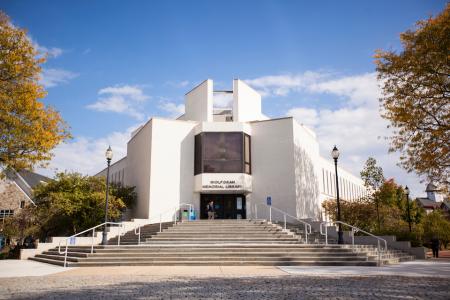 Wolfgram Memorial Library, Widener University-Chester
Wolfgram Memorial Library, Widener University-Chester
Since its dedication in 1970, the Wolfgram Memorial Library on the campus of Widener University-Chester in Pennsylvania has actively built a collection of more than 180,000 volumes. Three years ago Roz Goldstein, head of technical services and automated systems, undertook a collection management project to review the library’s holdings and determine which books no longer fit the library’s collection priorities.
The library packed up the older, underutilized books in boxes provided by BWB, which also paid for the shipping. Over the past two years, the library has contributed about 13,000 books to BWB, covering a wide variety of subjects, mostly non-fiction. Goldstein says the library’s main priority was managing collection space, but knowing some will see a broader audience is an added benefit.
“I was thrilled to find out that 600 of our titles have been sent to the Internet Archive to be digitized,” says Goldstein, who has shared her experience with other library colleagues and encouraged them to partner with BWB.
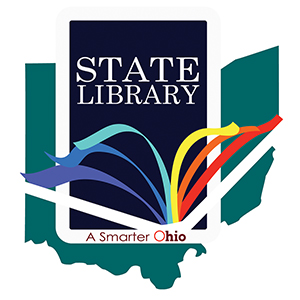
At the SEO Service Center, a branch of the State Library of Ohio, Jay Miley works with 98 libraries as the customer service and library systems manager. In January, he started sifting through 120,000 volumes stored in a central library building to see what no longer fit their collection development priorities. About 20,000 books were moved to local branches due to demand within the system for physical access. Then Miley began to look into options for some lesser-used books — not wanting them to end up in landfill.
Miley discovered BWB was a popular option among other state libraries, and he began to pack up boxes. So far, Ohio has shipped about 12,000 items to BWB and another 38,000 are queued for processing. Recently, he learned that 1,200 of the books that came from his library have been digitized and made available through the Internet Archive. “I think it’s awesome,” he says. “I immediately told my team, my boss and the state librarian.”
A growing impact
Over the past three years, the relationship between Better World Books and the Internet Archive has only grown stronger. BWB has streamlined the logistics of getting materials to the Internet Archive, Holland says, and the impact continues to grow. “The biggest thing we need to do is to educate and shout from the rooftops—to tell more people what we’re doing and how valuable this is for society.”
If your library is interested in learning more about the services that Better World Books provides to libraries, please check out the BWB Services page.
The post Saving 4 Million Books From Landfill appeared first on Internet Archive Blogs.
Author: “The Internet Archive is the most useful library.”
Editor’s note: Recently we asked our patrons to submit stories about how they use our library in their research. If you’d like to share your story, please leave comments here.
From author Larry Dieterich, in his own words: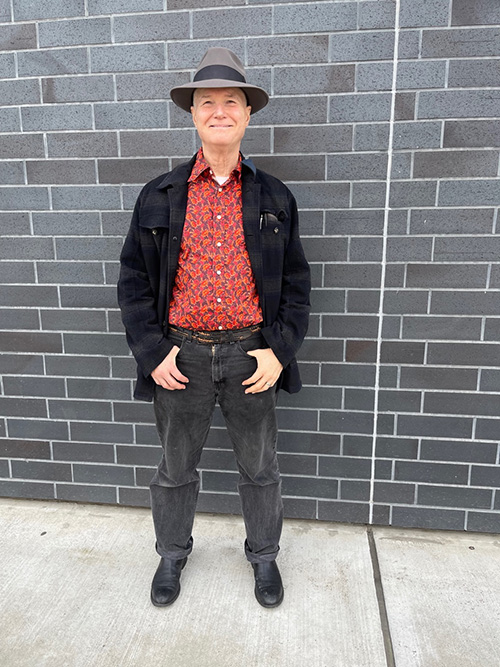 Author Larry Dieterich
Author Larry Dieterich
I live in Davis, CA where I have excellent library resources. I am currently engaged in research for a book I’m writing, which contains a feminist deconstruction of the Biblical creation myth originally told in the third chapter of Genesis.
The research materials I am using for this project are often found in books; both new and old. I recently was recommended a book published in 2003; The Beginning of Wisdom by Leon R. Kass. Someone suggested this book might be useful for my research into the Biblical backstory of Eve and the Snake.
My local library does not have this particular book. I checked with Amazon and found that I could purchase a used copy and have it delivered to my home for about $9. The book contains 700 pages and since I already have many books in limited space, borrowing the book was clearly the best option: I didn’t know if the book was something I could even use, much less want to own.
I am a patron of the San Francisco Public Library and I checked their online catalog and found that they do own a copy of the book. The library’s website indicated and that the book ‘may be on the shelf’ in the main library, but I would have to drive to San Francisco to find out.
Before driving 70 miles to check the shelves, I thought to check the Internet Archive. It turns out that they own several copies of this particular book! I was able to borrow and begin reading it immediately, at no cost, without leaving my home. This saved me from having to drive 140 miles to borrow the book and another 140 miles to return it.
[T]he ability to quickly search the full text of the books I borrow from the Internet Archive is amazingly useful.
Larry Dieterich, authorThe real value for my research, however, came when I perused the book I had borrowed. It turns out that the particular information I was looking for in this book was marginally useful to my research, but the digitized copy of the book was searchable in its full text. On a whim, I searched for the word “moon” and I found that the book discussed, in unexpected depth, another important subject for my research: the origins of time. I was able to quickly and easily expand my research to access some useful information that I didn’t expect to find in this book. It is unlikely that I would have looked for this esoteric content in the physical book. The convenience and power of the full-text search capability provided by the digital form of the book worked like magic.
In summary; I was able to avoid driving 280 miles to borrow and return the book, and the digitized copy I borrowed from the Internet Archive allowed me to easily find unexpected, and very useful, information for my research.
The Internet Archive is the most useful library. I honestly don’t think that the research I am doing would succeed without the resources provided by Internet Archive. The ability to access the library from my personal computer means that I can use the library at any time of day or night and without traveling. The Wayback Machine is invaluable for finding webpages that are no longer available anywhere else and I use it often. The digitized books I borrow from the Internet Archive have the ability to increase the size of the print; which is a real benefit for me as my visual acuity has declined with age. Also, the ability to quickly search the full text of the books I borrow from the Internet Archive is amazingly useful.
I am grateful to the folks at the Archive for creating and maintaining this truly awesome public resource. Please keep adding knowledge of all sorts.
If you’d like to share your story, please leave comments here.
The post Author: “The Internet Archive is the most useful library.” appeared first on Internet Archive Blogs.
Book Talk: Athena Unbound
Join CHRIS BOURG in conversation with author PETER BALDWIN about the history & promise of the open access movement.

“In Athena Unbound, Peter Baldwin offers an admirably pragmatic yet principled approach to the perennial problem of encouraging both the production and distribution of knowledge.” – Paul Romer, Nobel Laureate and University Professor, NYU
Book Talk: Athena Unbound
March 28 @ 10am PT / 1pm ET
Register now for the virtual event
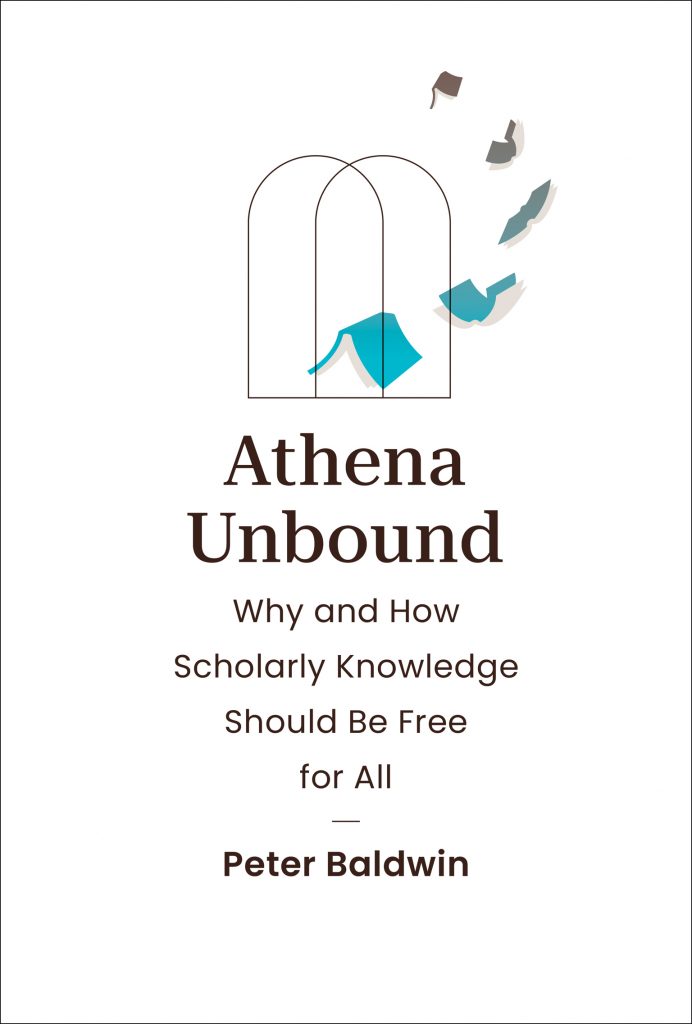 Read or purchase Athena Unbound from MIT Press. (Pub date: March 28, 2023)
Read or purchase Athena Unbound from MIT Press. (Pub date: March 28, 2023)
Open access (OA) could one day put the sum of human knowledge at our fingertips. But the goal of allowing everyone to read everything faces fierce resistance. In Athena Unbound, Peter Baldwin offers an up-to-date look at the ideals and history behind OA, and unpacks the controversies that arise when the dream of limitless information slams into entrenched interests in favor of the status quo. In addition to providing a clear analysis of the debates, Baldwin focuses on thorny issues such as copyright and ways to pay for “free” knowledge. He also provides a roadmap that would make OA economically viable and, as a result, advance one of humanity’s age-old ambitions.
Baldwin addresses the arguments in terms of disseminating scientific research, the history of intellectual property and copyright, and the development of the university and research establishment. As he notes, the hard sciences have already created a funding model that increasingly provides open access, but at the cost of crowding out the humanities. Baldwin proposes a new system that would shift costs from consumers to producers and free scholarly knowledge from the paywalls and institutional barriers that keep it from much of the world.
REGISTER NOWRich in detail and free of jargon, Athena Unbound is an essential primer on the state of the global open access movement.
About our speakersPETER BALDWIN is Professor of History at UCLA, and Global Distinguished Professor at NYU. His recent books are Command and Persuade: Crime, Law, and the State across History (MIT Press); Fighting the First Wave: Why the Coronavirus Was Tackled So Differently across the Globe; and The Copyright Wars: Three Centuries of Trans-Atlantic Battle. He serves on the boards of the New York Public Library, the American Council of Learned Societies, the Wikimedia Endowment, the Central European University, the Danish Institute of Advanced Studies, and as chair of the Board of the Center for Jewish History. His journalistic writings have appeared in the New York Times, the Los Angeles Times, CNN, Newsweek, New Republic, Huffington Post, Der Spiegel, Berliner Zeitung, Publishers Weekly, American Interest, Chronicle of Higher Education, Prospect, American Interest, and Zocalo Public Square.
CHRIS BOURG is the Director of Libraries at Massachusetts Institute of Technology (MIT), where she also has oversight of the MIT Press. She is also the founding director of the Center for Research on Equitable and Open Scholarship (CREOS). Prior to assuming her role at MIT, Chris worked for 12 years in the Stanford University Libraries. Before Stanford, she spent 10 years as an active-duty U.S. Army officer, including three years on the faculty at the United States Military Academy at West Point. She received her BA from Duke University, her MA from the University of Maryland, and her MA and Ph.D. in sociology from Stanford.
Book Talk: Athena Unbound
March 28 @ 10am PT / 1pm ET
Register now for the virtual event
The post Book Talk: Athena Unbound appeared first on Internet Archive Blogs.
DLARC Amateur Radio Library Adds 10,000 Magazines, Bulletins, Newsletters, and Podcasts
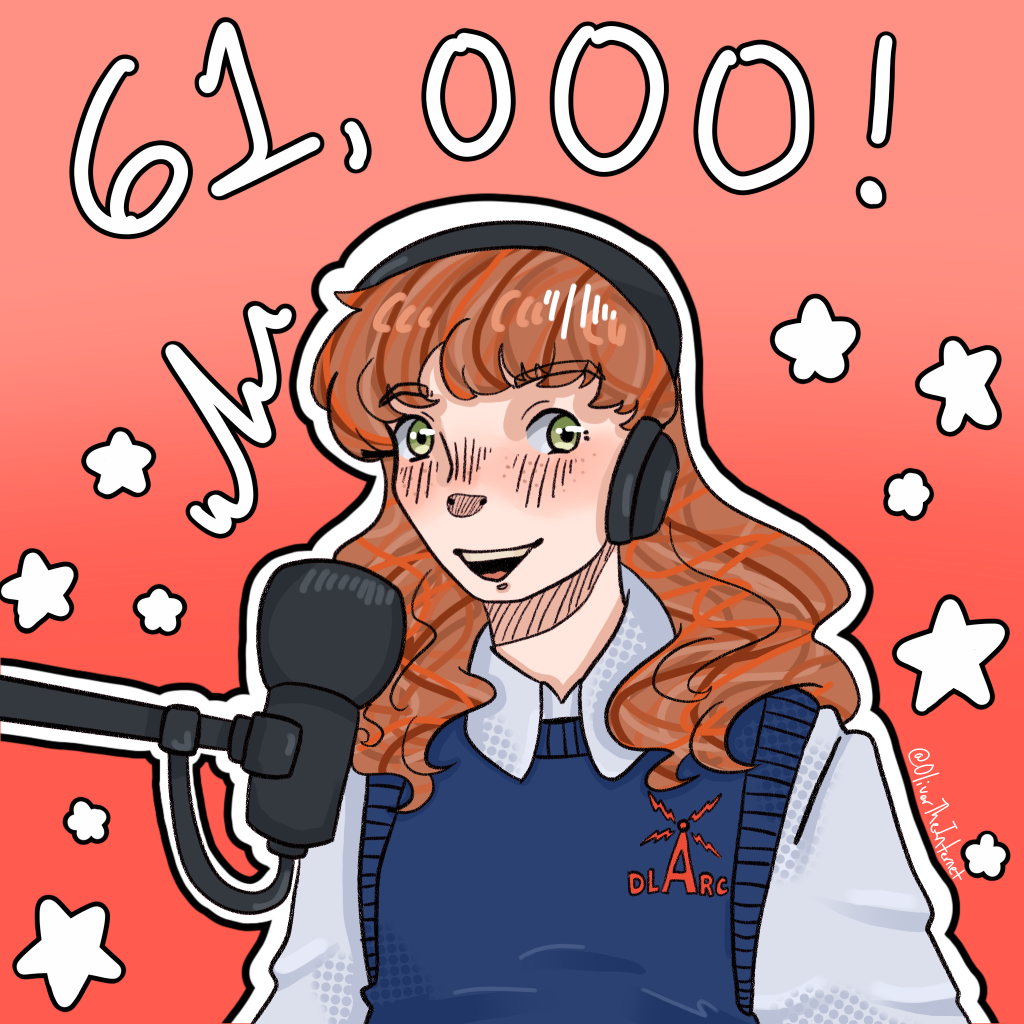
Launched just five months ago, Internet Archive’s Digital Library of Amateur Radio & Communications has expanded to more than 61,000 items related to amateur radio, shortwave listening, and related communications. The library’s newest additions include deep historical resources and contemporary reporting about the world of radio.
These include Amateur Radio Newsline, a weekly audio news bulletin: DLARC has added audio and scripts of about 700 episodes published from 2012 to the present, plus scripts for many Newsline episodes from the mid-1990s.
The library has also added 2,300 issues of DX Listening Digest, a newsletter about shortwave and DX radio published from 2000 through 2019. Its predecessor, Glenn Hauser’s Shortwave/DX Report, is also in this collection. Through these publications, 20 years of news about radio-world events are available to read, search, and download.
The DLARC Lending Library has expanded to more than 400 books for online borrowing via controlled digital lending. These books encompass all technical levels, from very basic to highly advanced. DLARC has also added thousands of issues of radio- and communications- related magazines and trade journals including Radio Electronics Magazine, QEX, Tele-tech, and Electronic Industries.
But not everything in the radio world is as mainstream: the library has added back issues of two newsletters that cover the fascinating world of numbers stations, pirate radio, and other odd activity of the radio waves: Numbers & Oddities and Enigma 2000. Nor is everything in English, such as Populaire Electronica and Elektronika Hobbie, Dutch-language magazines for electronics hobbyists published 1974 through 1980.
Ham radio clubs from around the world continue to contribute their newsletters and other creations. DLARC has added more than 300 newsletters from the Quarter Century Wireless Association, the international organization for amateur radio operators who were first licensed at least 25 years ago. New regional group newsletters include 340 issues of The GARzette, from Gwinnett Amateur Radio Society (Gwinnett County, Georgia); The Radiogram, from Portage County (Ohio, USA) Amateur Radio Service; 700 issues of CrossTalk, from Gloucester County (New Jersey) Amateur Radio Club; and NEVARC News, the newsletter of North East Victoria Amateur Radio Club, based in Australia.
Clubs’ contributions are not limited to newsletters. The Athens (Georgia) Radio Club has submitted more than 100 items to the DLARC library, including newsletters, meeting minutes, presentations, annual reports, and event photos.
For newsletters that were short-loved or where DLARC has been able to find only a few issues, there’s the new Miscellaneous Amateur Radio Newsletters collection. This enticing compilation includes YouthNet News, a short-lived, kid-published 1994 e-zine; 7415, a 1990 newsletter for “Internet Pirate Radio Listeners”; W5YI Report, 1984’s “up-to-the minute news of amateur radio and personal computing”; and Fidonet HAM-PACKET Digest, featuring packet radio news from the early 1990s.
DLARC continues to add ham radio e-mail and Usenet conversations from the early days of the Internet, including discussion threads from Ham-Policy Digest, which was a discussion list about amateur radio regulations; Ham-Equip Digest, about hardware and equipment; Ham-Space Digest, on space and satellite communications; and Ham-Ant Digest, about antenna topics.
The DLARC Podcast Collection now includes more than 40 podcasts — nearly 3,000 episodes in all. The latest additions include Ham Radio Workbench and the call-in show Ham Talk Live. Other additions include a dozen defunct podcasts: no longer published and hard to find online, now they remain part of the history of the amateur radio hobby.
The Digital Library of Amateur Radio & Communications is funded by a grant from Amateur Radio Digital Communications (ARDC) to create a free digital library for the radio community, researchers, educators, and students. DLARC invites radio clubs and individuals to submit collections of material, whether it’s already in digital format or not. Anyone with material to contribute or questions about the project, contact:
Kay Savetz, K6KJN
Program Manager, Special Collections
kay@archive.org
Mastodon: dlarc@mastodon.radio
The post DLARC Amateur Radio Library Adds 10,000 Magazines, Bulletins, Newsletters, and Podcasts appeared first on Internet Archive Blogs.
Celebrating Library Fair Use
It’s fair use week in the United States, and here at the Internet Archive, we join all those in the library community and beyond who celebrate the role fair use plays in enabling access to knowledge.
Fair use is a tremendously important part of US copyright law. From effectuating First Amendment rights to fostering innovation, the Supreme Court has described its “basic purpose” as “providing a context-based check that can help to keep a copyright monopoly within its lawful bounds.” And over the years, fair use has rightly evolved to ensure it can continue to play its role in changing times.
But fair use is not without its challenges. Professor Larry Lessig once famously quipped that “fair use in America simply means the right to hire a lawyer.” And given the associated expense, this can have an asymmetric effect on fair use. The book publishing industry, for example, is dominated by multi-billion-dollar firms; their economic power is so concentrated that a federal court recently enjoined a further attempt at consolidation. Meanwhile, although libraries collectively represent a substantial portion of book purchasers, their economic power is dispersed among many thousands of public, research, academic, and other institutions. Thus, while some may be willing to “roll the dice” on fair use, the costs and risks lead many to underuse this important user’s right.
As the defendant in a years-long fair use case of our own—recently scheduled for oral argument on March 20th—we are all too familiar with this aspect of the law. As our case demonstrates, the economic challenges of fair use are not only about legal fees; economics are embedded in the doctrine. In some ways, this is a good thing. For example, as we explained in our brief, fair use has always been concerned with protecting non-profit and educational uses of copyrighted works. When considering whether a particular use is fair, the first question is ordinarily whether it’s “noncommercial.” With respect to our own book collections, this is straightforward: the books are lawfully acquired, digitized at our own expense, and lent to one reader at a time—without any cost to them—for personal, research, or scholarly use. And while noncommerciality does, of course, have to be balanced against certain economic interests of the publishers as part of the fair use analysis, that’s precisely what the owned-to-loan ratio and other strictures of controlled digital lending work to do.
For all its challenges, fair use continues to provide important rights and safeguards to libraries. Among other things, it allows libraries to utilize new technologies and respond to new challenges without waiting for the legislature to pass new laws. In fact, this is exactly what the legislature intended it to do. Fair use means libraries can develop innovative services like our work to support Wikipedia citations, respond to new challenges like the COVID lockdowns, and otherwise continue to serve patrons as the world evolves. And it means libraries, like the Internet Archive and many others, can lend their books to one reader at a time, as they have always done.
The post Celebrating Library Fair Use appeared first on Internet Archive Blogs.
Punctum Books Helps Build Streamlined System for Archiving Open Access Monographs
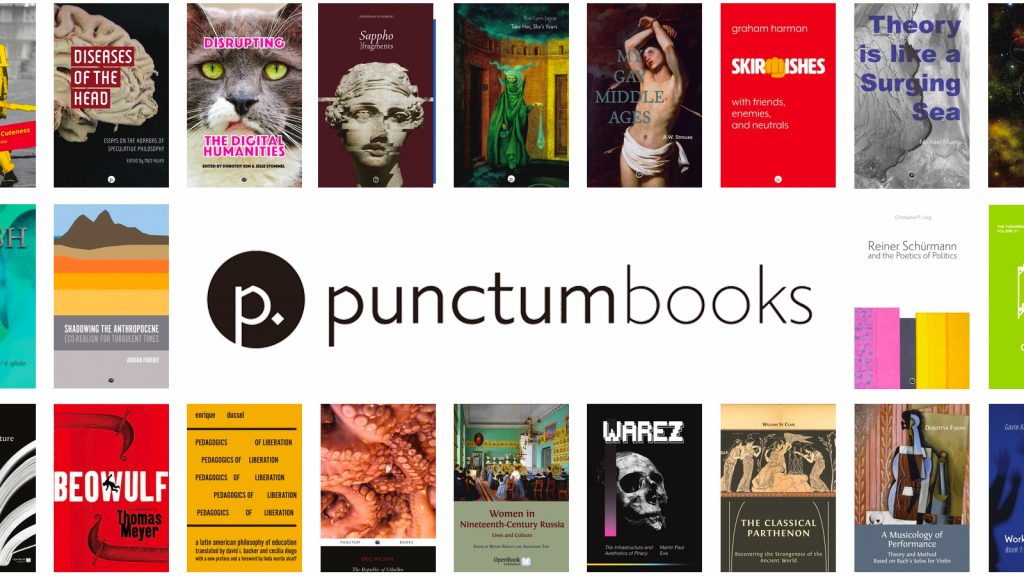
Since its founding in 2011, punctum books has been an independent, scholar- and queerled open access (OA) press committed to reshaping the way knowledge production is shared in academia and beyond.
Now, it is also a key player in the development of technology that’s making it easier for publishers to archive open access monographs.
The idea behind the open access movement is that scholarly research is a public good that should be made available to everyone in order to remove some of the technological and financial barriers to research and to accelerate education and research across the planet. Open access monographs are long-form scholarly publications released in the public domain under a Creative Commons or comparable license, which allows readers to freely access them without paywall. Authors of open access publications retain the copyright to their work.
“We strongly believe that publicly funded knowledge should be publicly available.”
Vincent W.J. van Gerven Oei, co-director of punctum books“We strongly believe that publicly funded knowledge should be publicly available,” said Vincent W.J. van Gerven Oei, co-director of the non-profit publisher, along with Eileen A. Fradenburg Joy. “This is an ideological commitment — and, for us, this has been a guiding light in all our publishing work.”
Recently, punctum published its entire catalogue of close to 400 books to the Internet Archive’s online collection. It includes books about queer studies, film and media studies, Anthropocene studies, recuperative work and titles dealing with the Medieval period.
Streamlining open access publishing
Not only did the publisher make its items freely available, it was also part of an effort to develop an open metadata management and dissemination system – known as Thoth – to encourage other open access publishers to do the same.
The automated deposit system was built as part of the Community-led Open Publication Infrastructures for Monographs (COPIM) project, an international partnership of researchers, universities, librarians, open access book publishers and infrastructure providers. The open source platform, funded by Arcadia and Research England, is designed to streamline the sharing of open access books.
 Vincent W.J. van Gerven Oei, co-director, punctum books
Vincent W.J. van Gerven Oei, co-director, punctum books
“We wanted to make the management of metadata more convenient, especially for small-scale publishers,” Van Gerven Oei said. “The systems to get digital publications into the world are very opaque and difficult to navigate. We developed a tool that makes everything easier. We hope that by offering this service the discoverability of open access books will be much better.”
Along with punctum, other scholar-led, open access publishers such as Open Book Publishers are using Thoth for their daily metadata management. Van Gerven Oei said there is never going to be one single solution to the distribution challenge for small open publishers, but he hopes this effort will redirect traffic to the Archive.
“The Internet Archive, as a central repository not only for publications, but for the entire history of the internet, is of vital importance,” Van Gerven Oei said. “I am happy that the Internet Archive is one of the first repositories connected to our work with Thoth.”
In addition, punctum is working with other libraries to develop open community-owned infrastructure to offer an alternative to commercial publishing infrastructures.
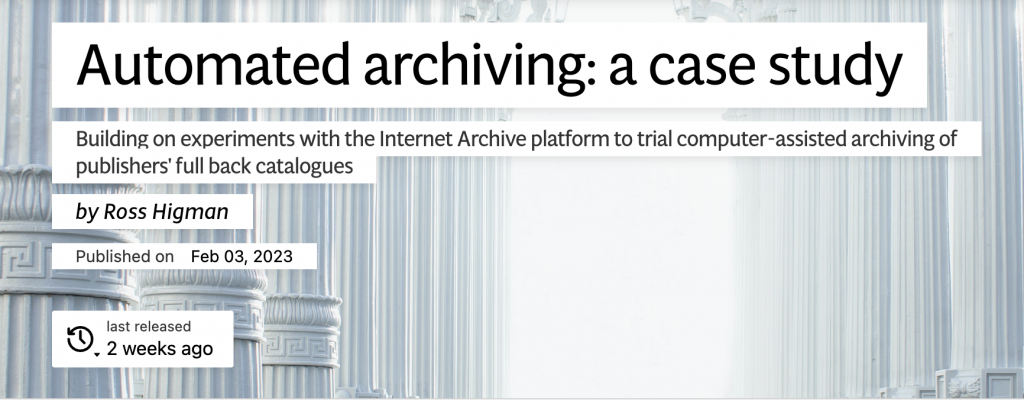 See recent COPIM blog post about the experimentation with automated archiving at Internet Archive.
See recent COPIM blog post about the experimentation with automated archiving at Internet Archive.
“We see libraries as our allies in our fight for open knowledge,” Van Gerven Oei said. “Knowledge is a public good that should not be a private enterprise at all.”
The Library-Publisher partnership
The founders of punctum believe the press has a moral obligation to provide its materials for free and allow authors to share, remix, and reuse.
Incorporated and based in Santa Barbara, California, punctum has a partnership with the University of California, Santa Barbara (UCSB) Library.
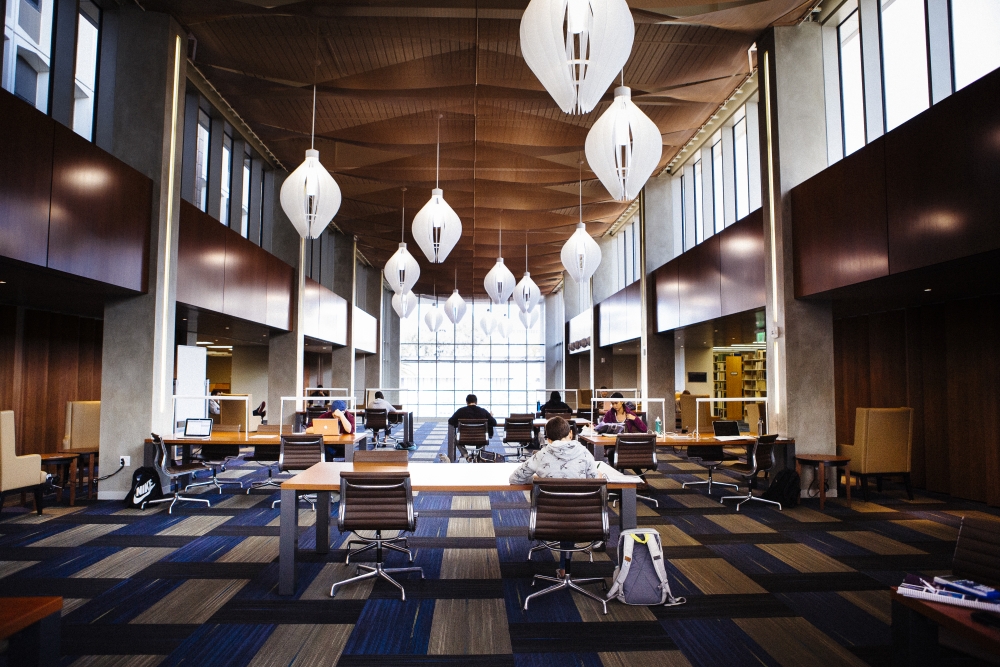 The UC Santa Barbara Library. Photo credit: UC SANTA BARBARA
The UC Santa Barbara Library. Photo credit: UC SANTA BARBARA
Together, they conducted a two-year pilot project from 2018-2020 to test a no-fees open access book publishing model for the humanities and social sciences.
“The goal was to develop best practices, protocols and infrastructure, technical and otherwise, around punctum’s digital catalog, and create a Library Membership Program,” said Lidia Uziel, associate university librarian for research resources and scholarly communication at UCSB Library. The objective was to support punctum’s operations while advancing the library’s interest in no-fee OA book publishing.
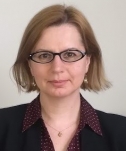 Lidia Uziel, associate university librarian, UCSB Library
Lidia Uziel, associate university librarian, UCSB Library
“It was a natural collaboration for the library,” said Uziel. “The University of California, Santa Barbara is very committed to opening up scholarship created by UCSB researchers to be freely available to the scholarly community globally. Making good on this commitment requires the investment of time, effort, and money toward transforming the current, very closed, scholarly publishing system for both journals and books.”
Many faculty members publish with punctum, because of shared values. UCSB community and punctum are both passionately committed to the mission of the public research library and to scholar-led, community-owned, and economically sustainable open science and publishing. The project was an opportunity for the library community, students, and faculty to learn about open access publishing through the lens of the pilot project and the partnership with punctum.
“Making good on [a commitment to open access] requires the investment of time, effort, and money toward transforming the current, very closed, scholarly publishing system for both journals and books.”
Lidia Uziel, associate university librarian, University of California, Santa Barbara (UCSB) LibraryThe relationship was mutually beneficial, as it was also a chance for punctum to broaden its distribution network.
“The partnership with UCSB has been a lifesaver,” Van Gerven Oei said. ”To get books out into the world – from publisher to readers – it’s not easy. UCSB Library helped us in understanding the landscape, finding allies, and getting metadata records in shape. In turn, we have provided students and faculty with knowledge of OA publishing.”
One of the outcomes of the pilot was the creation of punctum’s Supporting Library Membership Program. It now works with other libraries around the world on open access publishing.
“The library and scholarly communities have long advocated for free and unrestricted access to scholarly literature. The open science movement as a whole is gaining momentum, not only in the U.S., but also internationally,” Uziel said. “Open access publishing will continue to grow thanks to the implementation of OA policies by funders and institutions and the development of new innovative publishing models and open source platforms that facilitate the publication of OA content at a reduced cost. National and international library organizations are endorsing the OA policies and initiatives, and open access publishing is increasingly integrated into standard library operations.”
The road ahead
Experimentation on how to disseminate born digital books is happening across all sectors of publishing, with efforts like punctum books helping make systemic change across a field that has historically prioritized commerce over access, according to Maria Bustillos, editor of The Brick House.
“Free-thinking people are all involved in the same democratic, egalitarian project of building culture, whether they are librarians, academics, readers, students, journalists, artists or authors,” she said. “The sooner we all join forces to expand and protect the global commons, the better our world will be.”
- Browse & read the punctum books collection at the Internet Archive
- punctum books
- Thoth
- UCSB Library
Van Gerven Oei said he’s optimistic about the future of open access, but there needs to be policy and political will to support knowledge as a public good. In the meantime, he sees potential with providing online access to open access monographs.
“We have a deep understanding and love for all the forms of archives,” Van Gerven Oei said. “From the moment that the Internet Archive existed, we have been great fans of its omnivorous drive and applaud the enterprise. We are very happy to contribute even more data and become sustenance for future archivists.”
The post Punctum Books Helps Build Streamlined System for Archiving Open Access Monographs appeared first on Internet Archive Blogs.
Internet Archive Joins Library Groups at the Supreme Court
On February 23, 2023, the United States Supreme Court will hear oral arguments in Gonzalez v. Google. The case is, in a narrow sense, about whether certain algorithmic recommendations of a very large online platform can give rise to civil liability. But the Court’s ruling could fundamentally “reshape the internet”, redefining the circumstances in which a wide variety of websites and online services–including libraries–could be liable for the actions of their users. Internet Archive was proud to join the American Library Association, the Association of Research Libraries, the Freedom to Read Foundation, and the Electronic Frontier Foundation, in a “friend of the Court” brief urging robust Section 230 protections for libraries and others.
As the Association of Research Libraries has previously noted, “libraries are included in” the protections of Section 230, and “[a]ny changes to the liability protections of 230 may endanger the ability of libraries to fulfill their public service missions.” Following from this, our brief highlights a number of important library projects and services “designed to share and build knowledge” which are currently protected by Section 230; these could be threatened by sweeping changes to the law. In fact, providing a space for the maintenance and development of these kinds of projects is exactly what the framers of Section 230 set out to do: it was enacted “to promote the continued development of the Internet” and so that it could continue to provide “a forum for a true diversity of political discourse, unique opportunities for cultural development, and myriad avenues for intellectual activity.”
As the brief explains, substantial changes to Section 230 could frustrate these purposes by making it harder for libraries to use the internet to broaden and deepen the public’s access to knowledge (among other things). And while it is impossible to know exactly how Section 230 might be changed by the Court, and how those changes could impact the behavior of libraries and others who rely on Section 230 today, the brief highlights a number of concerning scenarios that we hope the Court will consider. These kinds of concerns have been raised by many, including Professor Eric Goldman, who has explained how changes to the law occasioned by this case could make it too costly or burdensome for many online services to operate the way they do today; this could result in an internet dominated by “a small number of voices” promoted by the largest corporations and hidden behind paywalls.
At the Internet Archive, despite the challenges, we continue to believe in the power of the internet to democratize and expand access to knowledge. As EFF said when it filed the brief, “[a]s the internet has grown, its problems have grown, too,” but we can “address those problems without weakening a law” that has provided meaningful protection to everyone, including libraries. As courts and legislatures consider changes to this existing legal structure, we hope they keep in mind the public’s interest, so we can work towards an internet that preserves public interest spaces and is shaped by public interest values.
The post Internet Archive Joins Library Groups at the Supreme Court appeared first on Internet Archive Blogs.
How do you use the Internet Archive in your research?
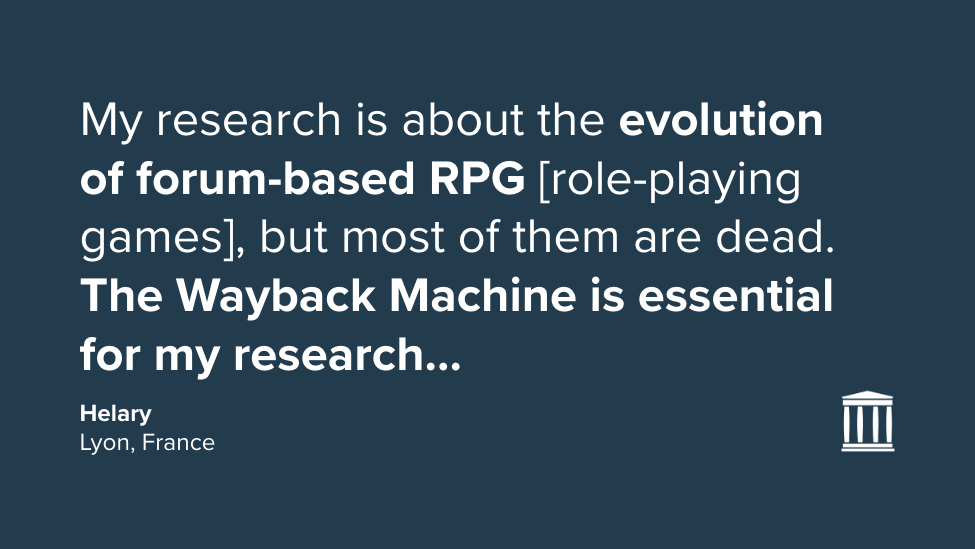
Tell us about your research & how you use the Internet Archive to further it! We are gathering testimonials about how our library & collections are used in different research projects & settings.
From using our books to check citations to doing large-scale data analysis using our web archives, we want to hear from you!
Share your story now!The post How do you use the Internet Archive in your research? appeared first on Internet Archive Blogs.
The Internet Archive Musiczoom Collection Continues
The start of the pandemic in 2020 had immediate effects on the Internet Archive, especially regarding the San Francisco-located headquarters.
A bustling building full of many dozens of simultaneous projects and conversations became an empty shell. The whole world was grappling with the new situation, and for the Archive, it meant many of the all-hands meetings were moved to strictly online, using Zoom conferencing. We learned fast to be online-first, where we remain currently.
There was one small glimmer of light in this darkness.
It was decided to hire artists to give pre-meeting musical performances at our weekly all-hands. This would add a bit of uplift to the morning gatherings, and allow musicians who had lost access to public performances to make a little income and share their music with a grateful audience of dozens of Internet Archive employees. It was a rousing success, and performances were added to our Friday Lunches as well.
The variety of musicians and performances have been amazing: Instrumentalists, Singers, Dancers, and a breathtaking spectrum of styles and acts have made an appearance on our (virtual) stage.
As was covered in a blog post in 2020, all sorts of great stories and opportunities to learn about these artists have been added to the record. The artists were asked if the Archive could archive their performances, and many have agreed.
The number of music concerts in The Internet Archive Musiczoom Collection has now passed over 200 individual works.
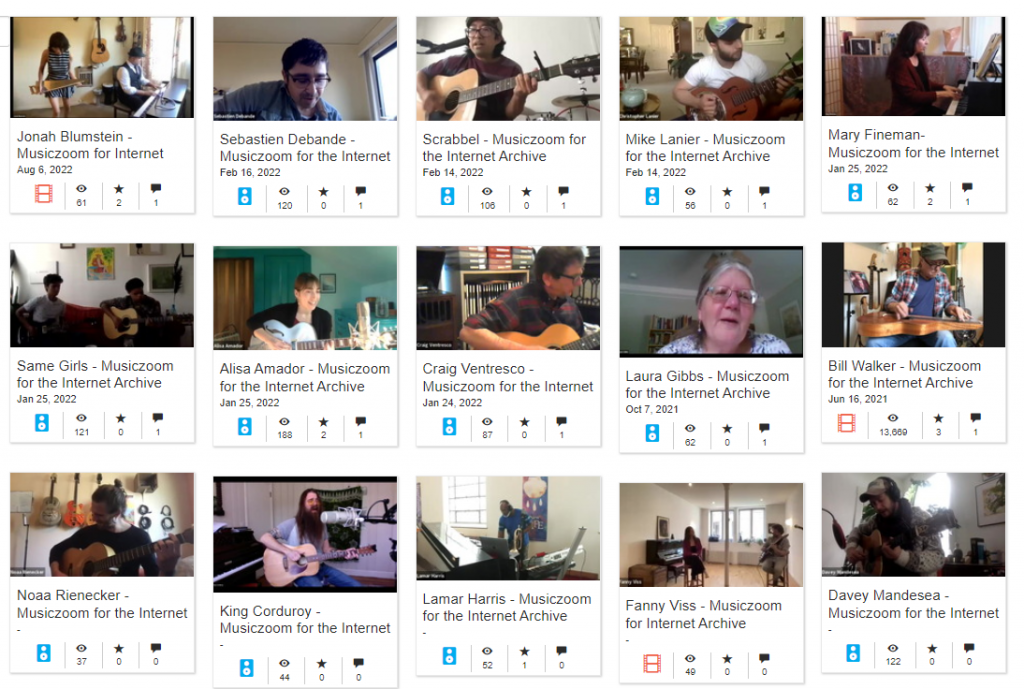
Some performers are clearly adjusting to their new circumstances, while others have created entire “online stages” for their performances. All of them show remarkable talent and resilience in willingness to do this strange “gig”, and we’ve even had repeat performances over the years.
We continue to enjoy the creative spirits that start our all-hands, and if you didn’t know about this growing and enjoyable collection… you do now.
Stop by anytime. And note that many of these performances have links to directly support the artists; please do if you can.
The post The Internet Archive Musiczoom Collection Continues appeared first on Internet Archive Blogs.
Internet Archive Submits Comments in Copyright Office Study of NFTs
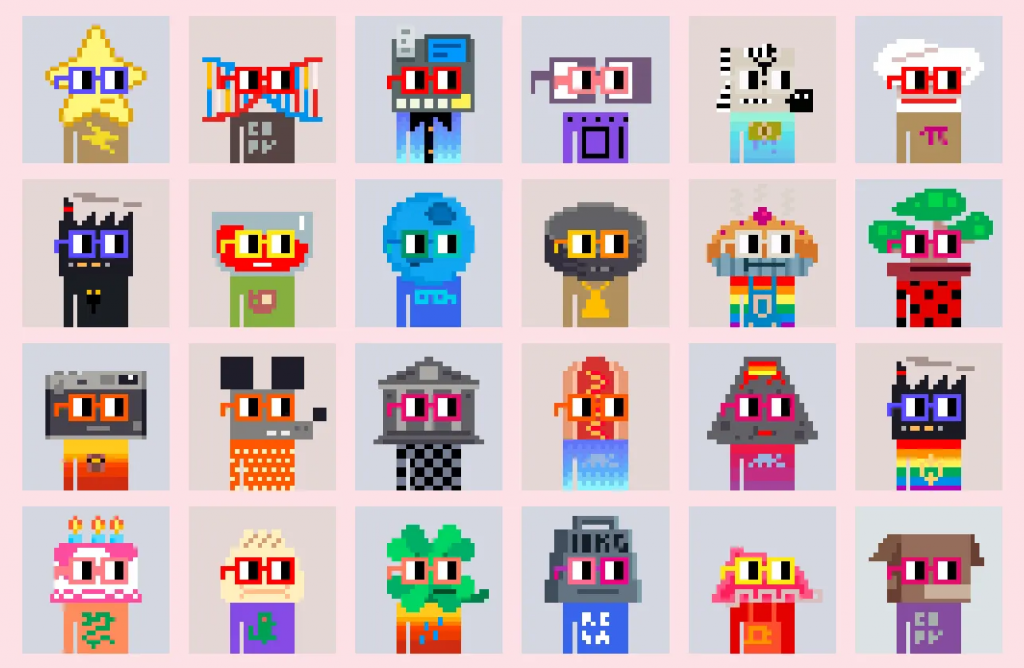 Nouns are NFT avatars generated by the Nouns protocol, all released into the public domain; all Nouns are equally rare because the project enforces “no explicit rules for attribute scarcity.”
Nouns are NFT avatars generated by the Nouns protocol, all released into the public domain; all Nouns are equally rare because the project enforces “no explicit rules for attribute scarcity.”
Last week, Internet Archive filed comments in response to the United States Copyright Office’s Non-Fungible Token Study. The study was launched by the Copyright Office, in partnership with the Patent and Trademark Office, in response to a letter from Senators Patrick Leahy and Thom Tillis. In their letter, the senators described their “interest in the continued development and use of emerging technologies [which] includes considering how best to secure intellectual property rights for emerging technologies and how to assess what impact these technologies might have on intellectual property rights.” They “urge[d]” the Copyright Office to “consult with the private sector” in undertaking the study, “drawing from the technological, creative, and academic sectors.”
While the Senators did not expressly invite the Office to consult with libraries or the public interest community, the Office opened the study to comments from the public at large. This was a welcome development. As digital rights group Public Knowledge has documented, participation by civil society and other public-interest-minded actors in Copyright Office matters can play an important role in ensuring the public interest is taken into account. With that role in mind, we were pleased to submit our comments in response to this latest study.
As mentioned in our comments, Internet Archive has been in active engagement with the Decentralized Web community for many years now, including convening and stewarding the development of DWeb Principles, sponsoring DWeb Camp, and participating in a variety of other projects and events. We recognize that NFTs have sparked debate within the DWeb community. Nevertheless, as policymakers are beginning to look at regulating decentralized technologies, we felt it important to weigh in with our perspective.
In particular, our comments encourage the Copyright Office to consider impacts on libraries—in particular the ways in which NFTs could help libraries develop long term, permanent digital collections. Our comments also encourage the Copyright Office to respect the choice of NFT artists who wish to release their underlying work under open licenses, as these build our common culture. You can read our full submission here.
The post Internet Archive Submits Comments in Copyright Office Study of NFTs appeared first on Internet Archive Blogs.
Our Digital History Is at Risk
This piece was first published by TIME Magazine, in their Ideas section, as Amid Musk’s Chaotic Reign at Twitter, Our Digital History Is at Risk. My thanks to the wonderful team at Time for their editorial and other assistance.
As Twitter has entered the Musk era, many people are leaving the platform or rethinking its role in their lives. Whether they join another platform like Mastodon (as I have) or continue on at Twitter, the instability occasioned by Twitter’s change in ownership has revealed an underlying instability in our digital information ecosystem.
Many have now seen how, when someone deletes their Twitter account, their profile, their tweets, even their direct messages, disappear. According to the MIT Technology Review, around a million people have left so far, and all of this information has left the platform along with them. The mass exodus from Twitter and the accompanying loss of information, while concerning in its own right, shows something fundamental about the construction of our digital information ecosystem: Information that was once readily available to you—that even seemed to belong to you—can disappear in a moment.
Losing access to information of private importance is surely concerning, but the situation is more worrying when we consider the role that digital networks play in our world today. Governments make official pronouncements online. Politicians campaign online. Writers and artists find audiences for their work and a place for their voice. Protest movements find traction and fellow travelers. And, of course, Twitter was a primary publishing platform of a certain U.S. president.
If Twitter were to fail entirely, all of this information could disappear from their site in an instant. This is an important part of our history. Shouldn’t we be trying to preserve it?
I’ve been working on these kinds of questions, and building solutions to some of them, for a long time. That’s part of why, over 25 years ago, I founded the Internet Archive. You may have heard of our “Wayback Machine,” a free service anyone can use to view archived web pages from the mid-1990’s to the present. This archive of the web has been built in collaboration with over a thousand libraries around the world, and it holds hundreds of billions of archived webpages today–including those presidential tweets (and many others). In addition, we’ve been preserving all kinds of important cultural artifacts in digital form: books, television news, government records, early sound and film collections, and much more.
The scale and scope of the Internet Archive can give it the appearance of something unique, but we are simply doing the work that libraries and archives have always done: Preserving and providing access to knowledge and cultural heritage. For thousands of years, libraries and archives have provided this important public service. I started the Internet Archive because I strongly believed that this work needed to continue in digital form and into the digital age.
While we have had many successes, it has not been easy. Like the record labels, many book publishers didn’t know what to make of the internet at first, but now they see new opportunities for financial gain. Platforms, too, tend to put their commercial interests first. Don’t get me wrong: Publishers and platforms continue to play an important role in bringing the work of creators to market, and sometimes assist in the preservation task. But companies close, and change hands, and their commercial interests can cut against preservation and other important public benefits.
Traditionally, libraries and archives filled this gap. But in the digital world, law and technology make their job increasingly difficult. For example, while a library could always simply buy a physical book on the open market in order to preserve it on their shelves, many publishers and platforms try to stop libraries from preserving information digitally. They may even use technical and legal measures to prevent libraries from doing so. While we strongly believe that fair use law enables libraries to perform traditional functions like preservation and lending in the digital environment, many publishers disagree, going so far as to sue libraries to stop them from doing so.
We should not accept this state of affairs. Free societies need access to history, unaltered by changing corporate or political interests. This is the role that libraries have played and need to keep playing. This brings us back to Twitter.
In 2010, Twitter had the tremendous foresight of engaging in a partnership with the Library of Congress to preserve old tweets. At the time, the Library of Congress had been tasked by Congress “to establish a national digital information infrastructure and preservation program.” It appeared that government and private industry were working together in search of a solution to the digital preservation problem, and that Twitter was leading the way.
It was not long before the situation broke down. In 2011, the Library of Congress issued a report noting the need for “legal and regulatory changes that would recognize the broad public interest in long-term access to digital content,” as well as the fact that “most libraries and archives cannot support under current funding” the necessary digital preservation infrastructure.” But no legal and regulatory changes have been forthcoming, and even before the 2011 report, Congress pulled tens of millions of dollars out of the preservation program. In these circumstances, it is perhaps unsurprising that, by 2017, the Library of Congress had ceased preserving most old tweets, and the National Digital Information Infrastructure and Preservation Program (NDIIPP) is no longer an active program at the Library of Congress. Furthermore, it is not clear whether Twitter’s new ownership will take further steps of its own to address the situation.
Whatever Musk does, the preservation of our digital cultural heritage should not have to rely on the beneficence of one man. We need to empower libraries by ensuring that they have the same rights with respect to digital materials that they have in the physical world. Whether that means archiving old tweets, lending books digitally, or even something as exciting (to me!) as 21st century interlibrary loan, what’s important is that we have a nationwide strategy for solving the technical and legal hurdles to getting this done.
The post Our Digital History Is at Risk appeared first on Internet Archive Blogs.
Book Talk: History, Disrupted
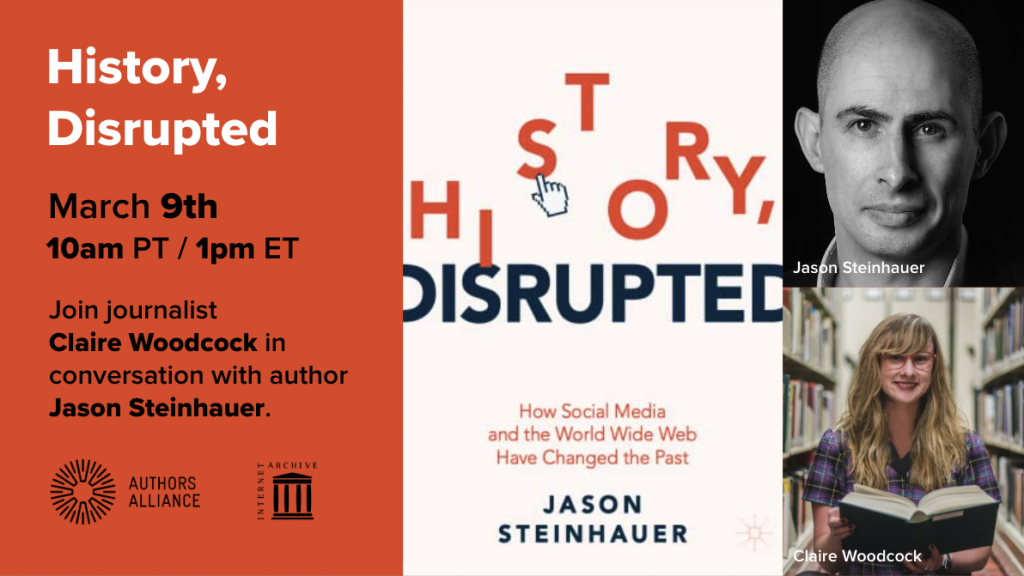
Join journalist CLAIRE WOODCOCK and author JASON STEINHAUER for a discussion about how social media & the web have changed the past.
REGISTER NOWThe Internet has changed the past. Social media, Wikipedia, mobile networks, and the viral and visual nature of the Web have filled the public sphere with historical information and misinformation, changing what we know about our history. This is the first book to chronicle how and why it matters.
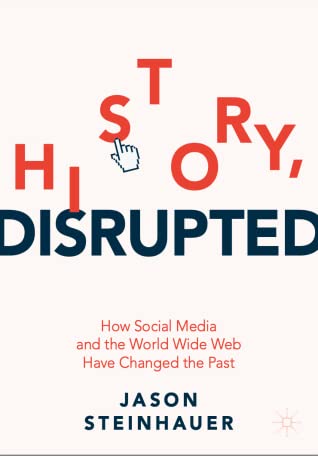 Purchase History, Disrupted from Better World Books.
Purchase History, Disrupted from Better World Books.
From Facebook, Twitter and Instagram to artificial intelligence, machine learning and algorithms, history has been widely communicated and fiercely contested across the social Web as battles over the 1619 Project, the Trump presidency, Confederate monuments and history textbooks have exploded into public view. How does history intersect with today’s most pressing debates? How does history contribute to online debates about misinformation, disinformation, journalism, tribalism, activism, democracy, politics and identity?
In the midst of growing political division around the world, this information is critical to an engaged citizenry. As we collectively grapple with the effects of technology and its capacity to destabilize our societies, scholars, educators and the general public should be aware of how the Web and social media shape what we know about ourselves – and crucially, about our past.
REGISTER NOWJASON STEINHAUER is a Global Fellow at the Wilson Center in the USA. He is the founder and host of History Club on Clubhouse with more than 100,000 followers, and was the Founding Director of the Lepage Center for History in the Public Interest at Villanova University, USA, from 2017 – 2020. A public historian with over twenty years of experience in major cultural and historical institutions in the US, Steinhauer is the Founder of the History Communication Institute and the creator of the field of History Communication, which examines how history gets communicated on the World Wide Web. He has written for CNN, TIME, The Washington Post, Poynter, Inside Higher Ed, the Philadelphia Inquirer and the Foreign Policy Research Institute (where he is a Senior Fellow). He has also delivered lectures overseas on behalf of the US Department of State, created a history podcast for the John W. Kluge Center at the Library of Congress, and appeared on C-SPAN’s American History TV.
CLAIRE WOODCOCK is an independent journalist based in Colorado. Her work has appeared in Motherboard Vice, NPR, Literary Hub, Aspen Public Radio, Boulder Weekly and many other publications. Her current work focuses on the politics of information in libraries. Woodcock graduated with a B.A. in English Literature from the University of New York at Fredonia in 2015 and is currently an M.A. candidate in the Media & Public Engagement program at CU Boulder. Woodcock is also a Digital Ownership Fellow with NYU Law’s Engelberg Center on Innovation Policy and Law, researching the digital book marketplace.
BOOK TALK: History, Disrupted
March 9 @ 10am PT / 1pm ET
Register now for the virtual discussion
The post Book Talk: History, Disrupted appeared first on Internet Archive Blogs.
A Calculated Move: Calculators Now Emulated at Internet Archive
It’s time to add another family of emulated older technology to the Internet Archive.
The vast majority of platforms within what we call The Emularity happens because of the work of MAME Team, which has spent over 25 years adding support for tens of thousands of machines, platforms, and tools to their breathtaking system. The amount of arcade machines and computers they now cover is so huge, a site exists just to keep track of what they don’t emulate… yet.
While we have an excellent family of emulators assisting MAME in making programs work in the browser, the vast majority of the items in our Internet Arcade (and Turbo Edition), Console Living Room, and Handheld History collections mostly have MAME to thank.
And now another can as well: The Calculator Drawer.

The Calculator Drawer is smaller than these other collections, but they possess a hearty collection of graphing and simple Calculators, emulated in MAME and with an additional layer of presenting the calculator itself, as a clickable graphical object, which you can then do math and graphing on. (You also need to turn many of them on, so look for the “ON” button to get things going.)
If Graphing Calculators were not a part of your childhood or previous life, they may be a bit of a steep climb to get to understand. If you still want to mess around with them, a stash of manuals for most of the models in the collection has been provided.
So, go forth and literally multiply.
However, if you wish to stick around a little bit longer…
The main reason you can do this wonderful “click on an image of a calculator as if it was a real object inside the browser” is because of a feature in MAME called MAME ARTWORK. It is one of a couple solutions to a major problem in emulation, especially of handheld devices, or tools like synthesizers or plastic toys.
The problem is that the actual “emulated” part of many of these machines are a tiny set of LED lights, or a line of LCD numbers, which is where all the circuitry presents its output, while the vast majority of the item is a static piece of metal or plastic with paint, labels and physical heft to the item. Compare, for example, the output of The Little Professor, emulated:

…to what the actual form factor of The Little Professor was:
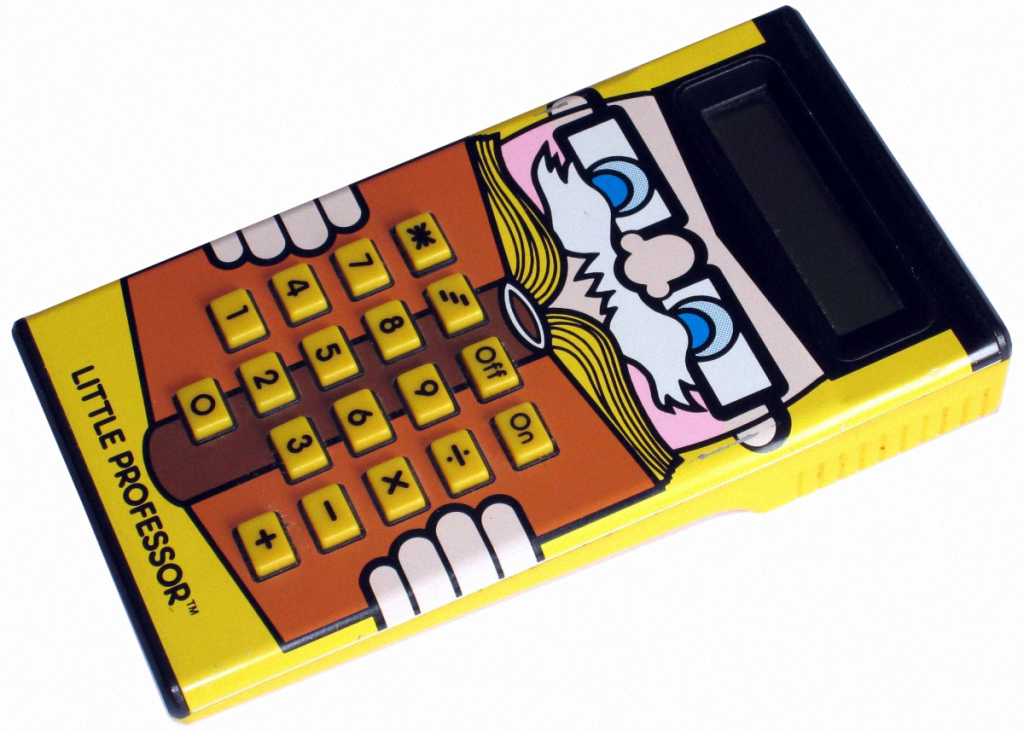
We can all agree that while one could make the keys for 0-9, OFF, ON and so on “work” on a keyboard input, it would be so much nicer if a representation of the Little Professor calculator was on the screen to type into, pressing keys by a touchscreen or via a mouse (while leaving the keyboard option active).
MAME has two different ways it can render an emulated device that needs “additional” drawing to augment the part of itself that’s reflecting the screen or lights of the device.
One is to have the MAME system itself do a line-drawing of the interface the machine is using. That is, actual vector-based drawing of the buttons, screen and other decorations to help users understand what they’re looking at. To provide a counter-example of The Little Professor, here’s a Chess-Master Diamond system in the plastic realm:
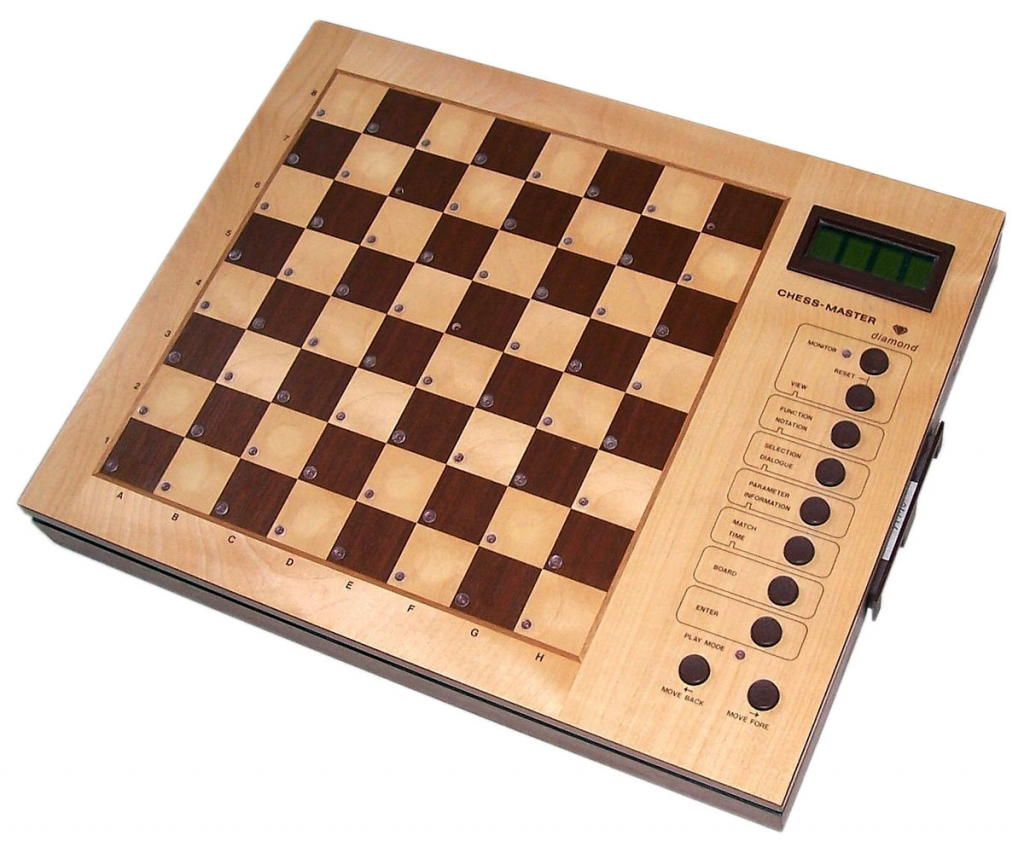
…and here’s what you’ll see when you boot it up in the MAME system:

..definitely pretty sweet, for sure!
And while it’s very nice this option exists, there’s something compelling about a photograph of an original item being shown on-screen along with interactivity, and the best part is how it doesn’t require a deep lore of programming.
It’s called The MAME Artwork System, and while it’s not completely easy to get a hang of, it’s been refined since being introduced in 2006, and it could use help.
There are some amazing efforts that have been done to make these “layout” files for items emulated by MAME, with the best clearinghouse for seeing this work at Mr. Do’s Arcade. By leafing through the collection of artwork made so far, you can see how much better the interface is with a graphical addition. There’s over 1,400 different systems that have gotten the Artwork Treatment, a major success.
But that’s still a tiny percentage of the systems that need to time, focus, and skills of volunteers to make them come alive in this way.
People are often inspired to want to help emulation efforts, since they’re the future of software’s history, but it can be daunting to find a place in, to ramp up to the mass of intricacies and standards of a decades-long project. But perhaps, out there, is someone, maybe even you, who would find it a delight to help acquire excellent photographs of vintage hardware, and collaborate on designing the layout files for them.
This effort will allow us to add more calculators, devices, and hardware out of MAME to be playable at the Internet Archive, and you’ll join the immortal names of the creation of this longstanding project.
Until then… enjoy the Calculators.
The post A Calculated Move: Calculators Now Emulated at Internet Archive appeared first on Internet Archive Blogs.
BBC Modi Documentary Removal
We have observed some confusion about the Internet Archive’s removal of links to a BBC documentary about Indian PM Narendra Modi (“India: the Modi Question”). Internet Archive can confirm that it has removed links in response to DMCA takedown requests from the BBC.
The post BBC Modi Documentary Removal appeared first on Internet Archive Blogs.
Archive for Amateur Radio Grows to 51,000 Items
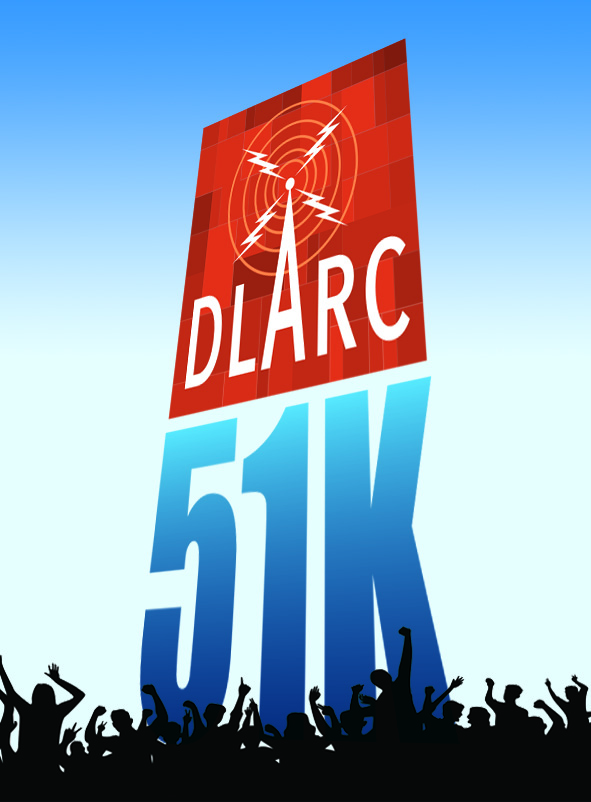
Internet Archive’s Digitial Library of Amateur Radio & Communications is quickly growing to become an important archive of radio’s past and present. The collection has blossomed to well over 51,000 items related to ham radio, shortwave listening, scanners, and related communications. The newest additions include books, journals and magazines, newsletters, and archives of early Internet discussion lists.
More than 3,300 books and magazines are now available via controlled digital lending in the DLARC lending library. These materials, including hundreds of magazine and journal issues including Popular Electronics, RF Design, and General Radio Experimenter, can be borrowed for online or offline reading, one reader at a time, by anyone with a free Internet Archive account. DLARC has also added amateur radio magazines QST from 1912-1961, Radio & Television News from 1919-1959, and Radio magazine from 1920-1947.
Nearly 1,300 episodes of The RAIN Report, an audio program that aired news and interviews relevant to the amateur radio community from 1985-2019, are now available, including hundreds of lost episodes, thanks to the help of the program’s producer, Hap Holly. DLARC has also added the 700-episode library of the National Radio Club DX Audio Service, which reported radio-related news from 1985 through 2015.
The archive of radio-related podcasts now includes QSO Today, Linux in the Ham Shack, RAIN Hamcast, Amateur Logic, and others.
Radio clubs are utilizing the DLARC archive to provide long-term backup of content and increase their visibility to new audiences. The Milwaukee Radio Amateurs’ Club, one of the oldest ham radio groups, is uploading its entire historical archive, an unparalleled collection of newsletters, correspondence, newspaper clippings, and meeting minutes documenting the group’s history.
Other group newsletters include British Amateur Television Club’s CQ-TV, the CWops Solid Copy newsletter for Morse code enthusiasts, Boulder Amateur Television Club TV Repeater’s REPEATER, and Scope, the newsletter of the Palomar Amateur Radio Club. The DLARC library has also added newsletters from radio clubs around the world, including the Dutch Amateur Radio Union, the Chester & District Radio Society (England), and the defunct Canadian Amateur Radio Operators’ Association.
DLARC now archives papers and presentation slides from 41 years of TAPR conferences, including the ARRL and TAPR Digital Communications Conference, and the Computer Networking Conference. The collection is accessible like never before, full-text searchable and with detailed metadata. In addition, TAPR’s Packet Status Register newsletter, published since 1982, is also archived.
DLARC has also begun archiving amateur radio email discussion lists, so far making tens of thousands of discussion threads available and searchable — going as far back as the late 1980s — for the first time in decades. The selection includes INFO-HAMS Digest, Boatanchors (a mailing list for fans of vacuum tube radios), Packet-Radio Digest, and Ham-Digital Digest.
DLARC is funded by a significant grant from Amateur Radio Digital Communications (ARDC) to create a digital library that documents, preserves, and provides open access to the history of this community.
The Digital Library of Amateur Radio & Communications invites radio clubs and individuals to submit collections of material, whether they are already in digital format or not. Anyone with material to contribute, questions about the project, or interest in creating a digital library for other professional communities, please contact:
Kay Savetz, K6KJN
Program Manager, Special Collections
kay@archive.org
Mastodon: dlarc@mastodon.radio
The post Archive for Amateur Radio Grows to 51,000 Items appeared first on Internet Archive Blogs.
Public Domain Day Film Contest Highlights Works of 1927
At Internet Archive we love to see how creative people can get with the material we make available online. As part of this year’s Public Domain Day celebration we asked the greater community to submit short films highlighting anything that was going to be made available in the Public Domain in 2023.
For the contest, vintage images and sounds were woven into creative films of 2-3 minutes. Many of the films were abstract while others educational, they all showcased the possibility when public domain materials are made openly available and accessible for download.
“The Internet Archive has spent 24 years collecting and archiving content from around the world…now is the time to see what people can do with it,” said Amir Saber Esfahani, director of special arts projects at the Internet Archive. He was an organizer and judge in the January short-film contest along with Yuanxiao Xu, who serves as Counsel at Creative Commons, and Rick Prelinger, who is an archivist and filmmaker, as well as a board member for the Internet Archive.
The judges reviewed 47 entries and chose a winner based on creativity, technique, engagement, and variety of 1925 content (including lists of all sources).
Contest Winners
First Place: Echo Echo by Gnats Gonzales
Second Place: The Public Domain Race by José Domingues and Leonardo Domingues
Third Place: Seeing Cats by Alex T. Jacobs
Honorable Mentions
There were so many amazing films that did not win the contest, so below are a selection of artists that we feel should get honorable mentions for their short films.
The post Public Domain Day Film Contest Highlights Works of 1927 appeared first on Internet Archive Blogs.
Public Domain Day Festivities Draw Global Audience of Enthusiasts
People from around the world — many wearing their best roaring ‘20s attire — came to the Internet Archive’s online party on January 19 to toast creative works recently added to the public domain.
The event was hosted in partnership with SPARC, Creative Commons, Library Futures, Authors Alliance, Public Knowledge, and Duke’s Center for the Study of the Public Domain.
Watch recordingView table of contents & speakers
“We’re celebrating works published in 1927 becoming open to all in the United States where we can legally share, post, and build upon them without permission or fee,” said Jennifer Jenkins of the Center for the Study of the Public Domain at Duke Law School. “You’re free to reimagine the characters, the events, the settings, the imagery, and use them in your own stories, musical plays, and movies.”
Librarians and archivists are eager to preserve these cultural materials, the vast majority of which are out of circulation. Now that they’re in the public domain, anyone can preserve them and digitize them — making them more discoverable.
“The public domain is important because it enables access to cultural materials that might otherwise be lost to history,” Jenkins said.
Among some of the best-known works that entered the public domain in 2023 include books, such as To the Lighthouse by Virginia Wolfe and The Big Four by Agatha Christie; sheet music for The Best Things in Life Are Free and I Scream, You Scream, We All Scream For Ice Cream; silent movies such as Metropolis by Fritz Lang, Putting Pants on Phillip with Stan Laurel and Oliver Hardy.
The first full-length film featuring synchronized sound was produced in 1927: The Jazz Singer with Al Jolson.
Rob Byrne, a film restorer and president of the San Francisco Silent Film Festival, explained at the event that previous films were not truly silent since every motion picture performance in the 1920s was accompanied by live musicians—from full orchestras in big cities to single piano players in small town theaters. The average American went to the movies more than three times every week, and international movies were accepted because there were no language barriers, Bryne added.
Unfortunately, more than 80% of all the films produced prior to 1930 have been lost.
Even fewer films featuring Black casts made for Black audiences survived, said Cara Cadoo, associate professor of history, cinema and media studies at Indiana University. “Race has always been a part of the story of the American cinema,” she said.
It was because she could easily view movies in the public domain that Cadoo said she was recently able to discover a clip from a lost Black film. Through some detective work, she identified footage from the 1917 film, “The Trooper of Troop K,” while studying another film from 2023. “This history is something that just in recent decades, people have taken seriously,” Cadoo said.
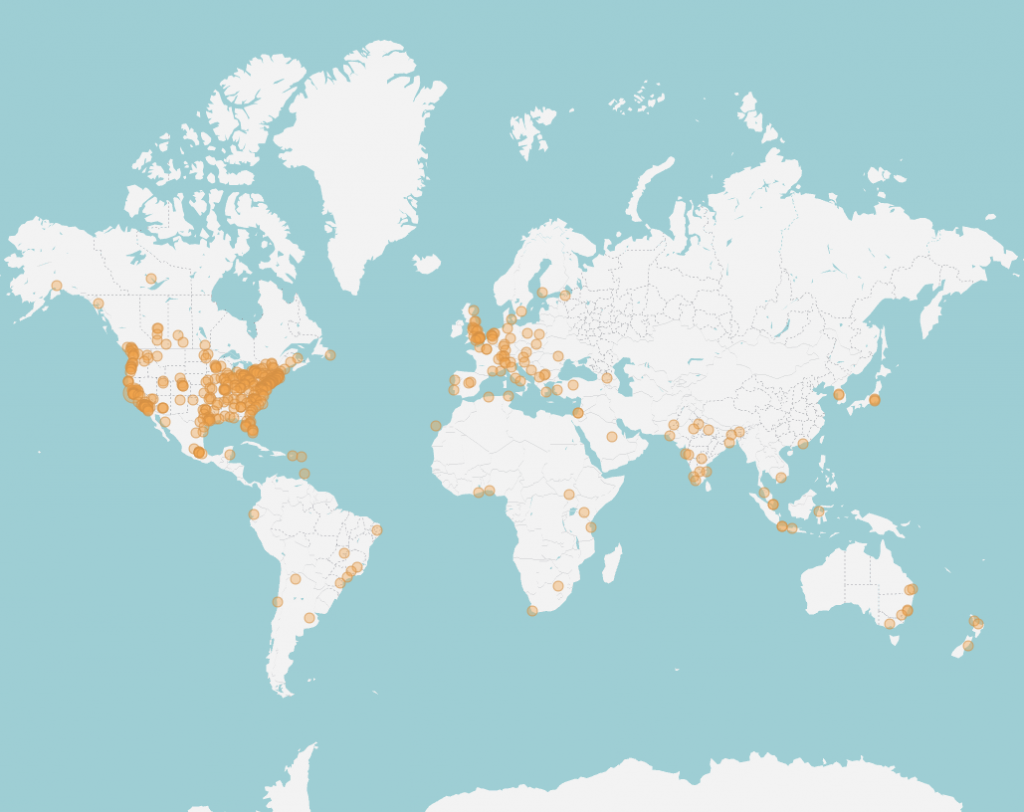 Interest in the public domain is global! The map above shows where our viewers watched the celebration.
Interest in the public domain is global! The map above shows where our viewers watched the celebration.
Brigitte Vezina, director of policy and open culture at Creative Commons, explained that libraries, museums and archives still face big challenges simply to fulfill their mission in the digital world. (See report Barriers to Open Culture.) Institutions are working in an outdated framework and copyright policy reform is needed, she said.
“We’ve been promoting open culture to build a more equitable, accessible, and innovative world,” said Vezina, citing its new call to action policy guide. “It’s based on this rich experience that our open culture program supports better sharing of cultural heritage globally.”
Along with works celebrated from 1927, SPARC’s Nick Shockey talked about another important milestone in expanding public access to knowledge. In August, the White House Office of Science and Technology Policy issued new guidance that requires the federal government set the default to open for all publicly funded research in the United States.
“This will make over $80 billion each year in research produced with the support of U.S. taxpayer dollars immediately available to anyone online,” Shockey said. “The priority is part of a broader commitment to advancing equity in science and scholarship and recognizing the ways in which openness can be a powerful enabler of more equitable systems.”
The government has also set 2023 as the Year of Open Science. What is and is not publicly and openly accessible is a public policy question, said Shockey, noting the disappointing 20-year pause for the Canadian public domain.
“As we celebrate today, I hope the momentum that we generate can be channeled into ongoing advocacy to ensure that more and more of the knowledge that shapes our world is made available to everybody and to more fully realize the right of sharing knowledge,” Shockey said.
For an example of the value of free sharing of information from the federal government, Meredith Rose, senior policy counsel with Public Knowledge, highlighted NASA’s public posting of images from the Webb space telescope.
“Some things are born free,” said Internet founder Brewster Kahle. “Democracies around the world publish openly because they believe in education and they want it to be spread as widely as possible.”
Open does not always mean easily accessible, however. Kahle is working on Democracy’s Library, a project to gather government material from the U.S., Canada and around the world and preserve them in one place.
“This is the internet we’re dreaming of. Let’s go and make sure that it’s got all of the public domain materials publicly accessible – not just all those things that are from the classic era. Let’s go and celebrate the current public domain.”
Also presenting at the celebration was Rick Prelinger, an archivist, filmmaker, writer and educator. He began collecting ephemeral films (used for specific purposes such as advertising, educational and industrial films) in 1983. His collection of 60,000 films was acquired by the Library of Congress in 2002. He partnered with the Internet Archive to make a subset of the collection — now more than 8,500 films — available online for free viewing, downloading and reuse in the Prelinger Archive.
Throughout the program, students from the Snowden International School (Boston) and the Ruth Asawa San Francisco School of The Arts (San Francisco) read poetry newly entered into the public domain from Caroling Dusk: an anthology of verse by Negro poets by Countee Cullen.
Jennie Rose Halperin, executive director of Library Futures, and Lila Bailey, senior policy counsel at the Internet Archive co-hosted the party.
[Cross-posted blog with SPARC / Internet Archive]
The post Public Domain Day Festivities Draw Global Audience of Enthusiasts appeared first on Internet Archive Blogs.







































































































![Reference manager - [Onderhoud aantekeningen]](https://labyrinth.rienkjonker.nl/sites/default/files/styles/medium/public/Reference%20manager%20v3%20-%20%5BOnderhoud%20aantekeningen%5D%2014-2-2010%20102617_0.jpg?itok=OJkkWhxY)
![Reference manager - [Onderhoud aantekeningen]](https://labyrinth.rienkjonker.nl/sites/default/files/styles/medium/public/Reference%20manager%20v3%20-%20%5BOnderhoud%20aantekeningen%5D%2014-2-2010%20102628.jpg?itok=CUvhRRr7)
![Reference manager - [Onderhoud bronnen] - Opnemen en onderhouden](https://labyrinth.rienkjonker.nl/sites/default/files/styles/medium/public/Reference%20manager%20v3%20-%20%5BOnderhoud%20bronnen%5D%2014-2-2010%20102418.jpg?itok=d7rnOhhK)
![Reference manager - [Onderhoud bronnen]](https://labyrinth.rienkjonker.nl/sites/default/files/styles/medium/public/Reference%20manager%20v3%20-%20%5BOnderhoud%20bronnen%5D%2014-2-2010%20102433.jpg?itok=CgS8R6cS)
![Reference manager - [Onderhoud bronnen]](https://labyrinth.rienkjonker.nl/sites/default/files/styles/medium/public/Reference%20manager%20v3%20-%20%5BOnderhoud%20bronnen%5D%2014-2-2010%20102445_0.jpg?itok=4oJ07yFZ)
![Reference manager - [Onderhoud bronnen]](https://labyrinth.rienkjonker.nl/sites/default/files/styles/medium/public/Reference%20manager%20v3%20-%20%5BOnderhoud%20bronnen%5D%2014-2-2010%20102500.jpg?itok=ExHJRjAO)
![Reference manager - [Onderhoud bronnen]](https://labyrinth.rienkjonker.nl/sites/default/files/styles/medium/public/Reference%20manager%20v3%20-%20%5BOnderhoud%20bronnen%5D%2014-2-2010%20102524.jpg?itok=IeHaYl_M)
![Reference manager - [Onderhoud bronnen]](https://labyrinth.rienkjonker.nl/sites/default/files/styles/medium/public/Reference%20manager%20v3%20-%20%5BOnderhoud%20bronnen%5D%2014-2-2010%20102534.jpg?itok=cdKP4u3I)
![Reference manager - [Onderhoud thema's en rubrieken]](https://labyrinth.rienkjonker.nl/sites/default/files/styles/medium/public/Reference%20manager%20v3%20-%20%5BOnderhoud%20themas%20en%20rubrieken%5D%2020-9-2009%20185626.jpg?itok=zM5uJ2Sf)













![Reference manager - [Raadplegen aantekeningen]](https://labyrinth.rienkjonker.nl/sites/default/files/styles/medium/public/Reference%20manager%20v3%20-%20%5BRaadplegen%20aantekeningen%5D%2020-9-2009%20185612.jpg?itok=RnX2qguF)
![Reference manager - [Relatie termen (thesaurus)]](https://labyrinth.rienkjonker.nl/sites/default/files/styles/medium/public/Reference%20manager%20v3%20-%20%5BRelatie%20termen%20%28thesaurus%29%5D%2014-2-2010%20102751.jpg?itok=SmxubGMD)
![Reference manager - [Thesaurus raadplegen]](https://labyrinth.rienkjonker.nl/sites/default/files/styles/medium/public/Reference%20manager%20v3%20-%20%5BThesaurus%20raadplegen%5D%2014-2-2010%20102732.jpg?itok=FWvNcckL)
![Reference manager - [Zoek thema en rubrieken]](https://labyrinth.rienkjonker.nl/sites/default/files/styles/medium/public/Reference%20manager%20v3%20-%20%5BZoek%20thema%20en%20rubrieken%5D%2020-9-2009%20185546.jpg?itok=6sUOZbvL)
![Reference manager - [Onderhoud rubrieken]](https://labyrinth.rienkjonker.nl/sites/default/files/styles/medium/public/Reference%20manager%20v3%2020-9-2009%20185634.jpg?itok=oZ8RFfVI)

![Reference manager - [Onderhoud aantekeningen]](https://labyrinth.rienkjonker.nl/sites/default/files/styles/medium/public/Reference%20manager%20v3%20-%20%5BOnderhoud%20aantekeningen%5D%2014-2-2010%20102603.jpg?itok=XMMJmuWz)


































































